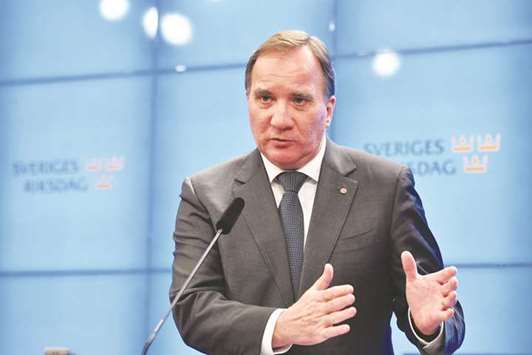Stefan Lofven, who seemed to have lost the prime minister’s job after this year’s elections, said yesterday that he would seek to form a broad government after being tapped by the speaker of the Swedish parliament to make an attempt at forming a government.
Lofven, the leader of Sweden’s Social Democrats, said he planned to conduct “confidential and frank talks” with other party leaders in the coming week with the aim to find a basis for a government that would transcend the political divide.
“During confidential talks you can test ideas. Negotiations via the media do not move things on,” he told reporters in parliament.
Parliament speaker Andreas Norlen earlier said he would propose Lofven as the new prime minister on December 3, and a confidence vote would be conducted a few days later, possibly December 5.
“The process has to move ahead,” Norlen told reporters in parliament.
Prior to the December 3 nomination, Lofven was to inform the speaker which parties he envisaged the government would comprise, Norlen said.
Both Norlen and Lofven said they were aware of growing impatience among the electorate about the impasse.
The speaker on Thursday consulted with party leaders after Centre Party leader Annie Loof said that she had given up her attempt to form a government.
She was the third party leader to make an attempt to form a government since September.
Loof’s week-long consultations had clarified some issues and parties now needed to consider possible changes in their stance, Norlen said.
Lofven concurred that Loof’s consultations had been “useful” as they had helped rule out some government options.
Loof noted, for instance, there was no support for her to lead a small minority government.
The Social Democrats would claim the premiership in any government they were part of, Lovfen said, citing the party was “by far the largest in parliament”.
Sweden’s general election on September 9 resulted in a political stalemate between the country’s two main political alliances, led by Lofven’s Social Democrats and the conservatives.
Neither bloc has a majority in the 349-seat legislature, complicating the formation of a new government.
Lofven is heading a caretaker government after he lost a mandatory confidence vote in late September.
Lofven’s left-leaning bloc has 144 seats, compared to 143 for a four-party centre-right group known as the Alliance.
Outside the blocs are the right-wing populist Sweden Democrats, which have the swing vote, with 62 seats.
However, they seem to be destined not to weigh in with those votes, as the other parties have ruled out working with the anti-immigration party.
Last week Ulf Kristersson, the leader of Sweden’s conservatives, failed in his bid to become prime minister and form a new government after losing a confidence vote.
Kristersson said yesterday that he was “prepared” to stand again, and that the decision to test Lofven in a confidence vote “was the only way to move ahead”.
Loof’s Centre Party, a traditional ally of the conservatives, voted against Kristersson, citing that his envisaged government, comprising the conservatives and the Christian Democrats, would be too reliant on the Sweden Democrats.
Jimmie Akesson, leader of the Sweden Democrats, has said his party favours a conservative-led government and does not fear new elections.
“[It is] reasonable that parliament votes on Stefan Lofven so that we can move on,” he said yesterday.
Norlen has three more attempts to propose a prime minister before fresh elections are automatically triggered.

Lofven: During confidential talks you can test ideas. Negotiations via the media do not move things on.
